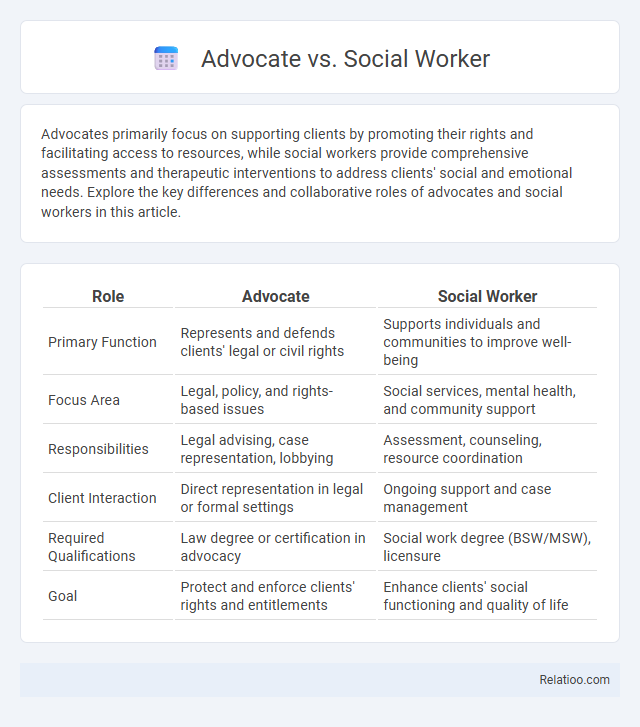Advocates primarily focus on supporting clients by promoting their rights and facilitating access to resources, while social workers provide comprehensive assessments and therapeutic interventions to address clients' social and emotional needs. Explore the key differences and collaborative roles of advocates and social workers in this article.
Table of Comparison
| Role | Advocate | Social Worker |
|---|---|---|
| Primary Function | Represents and defends clients' legal or civil rights | Supports individuals and communities to improve well-being |
| Focus Area | Legal, policy, and rights-based issues | Social services, mental health, and community support |
| Responsibilities | Legal advising, case representation, lobbying | Assessment, counseling, resource coordination |
| Client Interaction | Direct representation in legal or formal settings | Ongoing support and case management |
| Required Qualifications | Law degree or certification in advocacy | Social work degree (BSW/MSW), licensure |
| Goal | Protect and enforce clients' rights and entitlements | Enhance clients' social functioning and quality of life |
Advocate vs Social Worker: Key Definitions
An advocate is a professional who supports and promotes the rights and interests of individuals or groups, often working within legal, healthcare, or social justice fields to ensure their voices are heard. A social worker provides direct support and interventions to individuals, families, or communities, addressing social, emotional, and environmental challenges through assessment, counseling, and resource coordination. Understanding the key differences helps you determine whether legal representation or holistic social support best meets your needs.
Core Responsibilities of Advocates
Advocates primarily focus on representing and defending the rights and interests of individuals or groups, actively engaging in legal or policy-related processes to influence decision-making. Social workers provide comprehensive support by assessing clients' needs, offering counseling, and connecting them with community resources to improve overall well-being. Your understanding of advocacy highlights that it encompasses both the actions taken by advocates and social workers to promote justice, empowerment, and access to services for vulnerable populations.
Core Responsibilities of Social Workers
Social workers specialize in assessing clients' needs, providing counseling, connecting individuals to essential resources, and developing care plans to enhance well-being. Unlike advocates who primarily represent and support specific causes or individuals in legal or policy contexts, social workers engage directly with clients to address social, emotional, and environmental challenges. Their core responsibilities include crisis intervention, case management, and promoting social justice through personalized support and community resource coordination.
Similarities Between Advocates and Social Workers
Advocates and social workers both play crucial roles in supporting individuals and communities by promoting rights, access to resources, and social justice. Both professions require strong communication skills, empathy, and a commitment to empowering clients while addressing systemic barriers. Your ability to navigate complex social systems and advocate effectively can benefit from understanding the shared principles of advocacy and social work.
Major Differences in Education and Training
Advocates typically require specialized training in legal or policy fields, often holding degrees in law or public administration to effectively represent client interests. Social workers undergo rigorous education, usually earning a bachelor's or master's degree in social work (BSW or MSW), with clinical training focused on mental health, community resources, and client support. Advocacy is a broader concept involving various skills and informal education, where your ability to influence decisions and support causes depends more on practical experience than formal credentials.
Scope of Practice: Advocate vs Social Worker
Advocates primarily focus on representing and defending the rights of individuals or groups, often working within legal or community contexts to influence policy and access services. Social workers engage in a broader scope of practice that includes counseling, case management, and connecting clients with resources to improve their overall well-being and social functioning. Your choice between an advocate and a social worker depends on whether you need direct support with legal and rights-based issues or comprehensive social and emotional assistance.
Legal Roles and Ethical Boundaries
Advocates primarily provide legal representation and advice, often holding formal qualifications such as a law degree and bar admission, ensuring their actions comply with strict legal and ethical regulations. Social workers engage in advocacy by supporting client well-being and social justice, guided by professional codes emphasizing confidentiality, informed consent, and boundary-setting to avoid conflicts of interest. Advocacy involves promoting rights and access to services, requiring clear differentiation of roles to maintain ethical integrity and prevent unauthorized practice of law or breaches of client trust.
Impact on Communities and Individuals
Advocates directly influence policy changes and individual rights by representing specific community needs, ensuring marginalized voices are heard in legislative and social arenas. Social workers engage at the grassroots level, providing essential support and resources to vulnerable populations, which fosters long-term personal and communal development. Advocacy serves as the bridge connecting systemic reform and personal empowerment, mobilizing public awareness and resource allocation to address social inequalities and improve overall community well-being.
When to Seek an Advocate or a Social Worker
Seek an advocate when you require specialized support to navigate legal, medical, or educational systems and to ensure your rights are upheld. Contact a social worker for comprehensive assistance with mental health, family issues, or accessing community resources and social services. Advocacy involves actively supporting and representing individuals or groups, often provided by advocates or social workers depending on the context.
Choosing the Right Professional for Your Needs
Choosing the right professional for your needs depends on understanding that advocates specialize in representing and supporting individuals or groups in legal, social, or healthcare contexts, while social workers provide comprehensive counseling, resource coordination, and emotional support to address life challenges. Advocacy refers to the broader practice of promoting causes and rights, often employed by both advocates and social workers to empower clients. Your choice should align with whether you require direct legal advocacy, holistic social services, or targeted empowerment efforts.

Infographic: Advocate vs Social Worker
 relatioo.com
relatioo.com